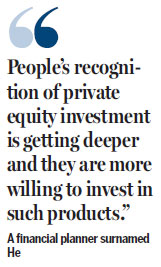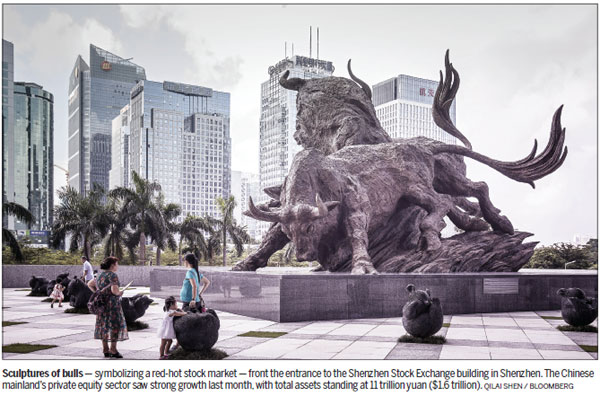Wealthy investors chase private equity funds
Updated: 2017-02-24 08:49
By Chai Hua in Shenzhen(HK Edition)
|
|||||||||
Potential stellar startup returns lure high net-worth individuals who see the golden era in stocks and properties as over
Private equity (PE) funds - which offer investment in private companies with great potential - have become popular investment channels among high net-worth individuals on the Chinese mainland.
The funds let more individual investors participate in the primary market by putting money in PE funds for a fixed holding period. Fund managers buy into targeted startups and profit as the targets' value increases.
About 84 percent of high net-worth investors in China had allocated assets to PE funds last year, according to the 2017 Noah Private Wealth White Paper Report released by Noah Holdings last month.

The report, based on a survey of more than 1,000 investors with assets of 10 million yuan ($1.45 million) or more, showed investment in PE funds accounted for 24 percent of these high net-worth investors' assets, with 7.8 percent of them pouring half their assets into the pool.
About 70 percent of this group planned to increase PE purchases and just 1.4 percent would cut their allocations to PE.
Xie Rongping, a 36-year-old employee at a Shenzhen-based internet company, is one of the PE investors. In the past decade, he has invested in the stock and property markets, both domestic and overseas, but fears these assets' golden times have passed.
He saw PE as the next golden opportunity so jumped in with five million yuan, which was invested into four PE funds active in the internet, robot and online to offline (O2O) sectors.
However, opportunities offered by PE are not for everyone.
China Securities Regulatory Commission rules stipulate that a qualified investor must put at least 1 million yuan into a single privately raised fund and have financial assets of no less than 3 million yuan, or an average annual personal income of not less than 500,000 yuan over the past three years.
But, rocketing homes prices have turned many nine-to-five office workers in first-tier cities into millionaires and even multi-millionaires, creating a larger pool of individuals who could participate in PE investment.
Taking Xie as an example, he earns about 750,000 yuan annually on average, but the value of his apartments in Shenzhen has soared almost ten times, making him a multi-millionaire.
According to the Hurun Report, there were 240,000 people in Guangdong province alone with assets of 10 million yuan or more last year. Many had accumulated assets through apartment trading.
A financial planner surnamed He told China Daily he had about 10 clients with assets of more than 40 million yuan. All had invested in PE products.
"People's recognition of PE investment is getting deeper and they are more willing to invest in such products," He said. A client usually took a month to make a PE investment decision.
He works for an internet-based wealth-management platform, Shenzhen Jin Fuzi Network Technology, which releases about four new PE products for investors each month.
Sometimes, a product requiring dozens of millions of yuan in capital could be sold out in just two days, He said.
Shenzhen investor Xie favored PE products because of the high return rate. Xie invested in Shenzhen-based humanoid robot maker Ubtech.
"I jumped in during the startup's B-round fundraising when its evaluation was $1 billion, but it increased to about $5 billion in about one year," Xie said.
That meant his investment had expanded about five times in just one year.
Investors last year could achieve an average return of 3.24 times input when the invested projects were listed, an exit method with one of the highest return rates, according to data from Beijing-based Zero2 IPO Research.
Li Yaoshen, senior research director of Noah's wealth research and development center, believed the Chinese mainland would enter a new era of PE investment.
He said the United States' PE industry grew in the 1970s and exploded in the 1980s, similar to the current situation on the mainland.
About 15,800 PE funds with capital under management of 4.3 trillion yuan had registered with the Asset Management Association of China by the end of last year. The number grew 120 per cent from the previous year, and the value was 55 percent higher.
PE funds gave high net-worth individuals opportunities and supported the development of innovative startups on the mainland.
Yu Bin, fund manager of quantitative and derivatives investment at Penghua Fund Management, said the funds could support the development of many qualified firms whose financial needs could not be satisfied by traditional economic tools.
Many companies would use PE to raise funds in the future in a bid to increase their input of R&D and production, he noted, so that they can grow rapidly.
Jin Fuzi's chief executive Zhang Kaixing pointed out that along with strong returns, PE investment came with high risks. He believed the biggest risk was capital liquidity because the holding period of PE products was relatively long - five to seven years or even longer.
"The time duration should be in line with the speed of a company's growth." He believed a wise investment should be in parallel with the targeted startup's growth in a bid to earn long-term profit.
Xie had no worries over risk. "The advantage of being office workers is having stable monthly income, so the most important thing for me is to work harder."
grace@chinadailyhk.com


(HK Edition 02/24/2017 page9)